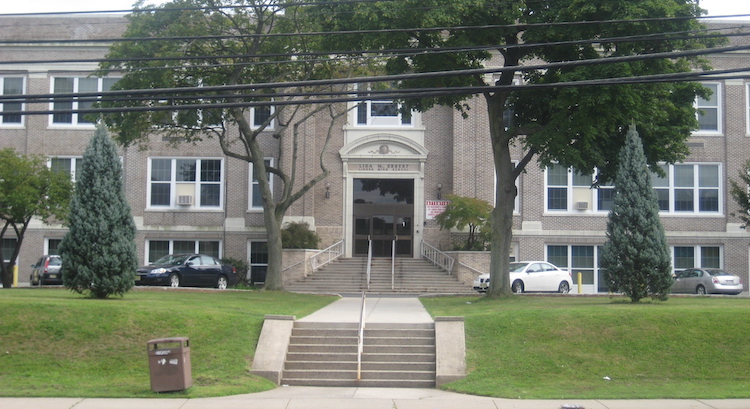Do you have an irrational fear of black hats? Are you kept awake at night by terrifying thoughts that someone, somewhere is praying? Even—gasp—studying ancient texts?
You might consider running for mayor or city council in one of New Jersey’s bastions of progressive tolerance, places where hate has no home.
Take Linden, the latest in a line of localities that have used zoning laws to enforce an unofficial quota of Jewish residents. In 2017, the town began passing zoning laws in an attempt to reverse the continued growth of its Orthodox Jewish community. At the time, you needed a 25,000-square-foot lot to build a house of worship. As Yitzchok Landa wrote this week: “All too quickly, however, the zoning was changed to require a minimum of 75,000 square feet, limiting options to a handful of sites. It was then revised upward again to 90,000 feet, of which there are no lots in Linden. Combining smaller lots was outlawed. This made it impossible to get a shul approved within the city, forcing Jews to meet for prayer gatherings in homes.”
Jewish life in Linden was thus made “difficult, but not impossible.”
But what if impossible is the goal?
After the synagogue zoning games, Linden decided to chip away at other Orthodox housing needs, restricting land-use and reducing footprint limits. Building permits were slowed to a crawl. Other rules targeted Jewish school buses and even piping for the mikvah, the ritual bath.
Fast-forward to last week. “Jewish families flood chaotic N.J. council meeting to fight zoning changes” blared an NJ.com headline on April 18. The town had again proposed restrictions that seemed clearly targeted at the Jews of Linden.
Since Orthodox Jews tend to have larger families, they often need more living space. Strict kashrus needs can be more easily accommodated with larger kitchens or additional small kitchens. So one tactic that towns will use against them is to lower the permissible amount of impervious coverage—essentially any material that prevents water from being soaked up by the ground. Officials will claim nonexistent environmental concerns and make it harder to build a bigger house.
Jewish families work within these rules by expanding up, not out. When that isn’t an option, they find a way to use the existing rooms in the house for those purposes—by, say, turning a salon into a bedroom, etc. That April 18 meeting was called to restrict this, too. Linden decided residents should not be allowed to sleep in their basements, even if those basements are finished and have proper egress in case of flooding or fire. No kitchens or even bathrooms down there either, said the town.
Essentially, the town was trying to limit family size. In that vein, the proposals would have also required every house to have a garage—a comically absurd requirement designed to ensure that you couldn’t even have enough bedrooms on the ground or second floor of a home—and a “single, narrow driveway,” according to mycentraljersey.com.
So yes, residents “flooded” the meeting to oppose certifiably insane regulations aimed at pushing them out of town. What year is this again?
The town agreed to make some revisions. But a week later, NJ.com reported, the Jews were at it again: “Outraged Jewish families flood N.J. council meeting again as town passes zoning changes.” I am begging that publication to find a new metaphor.
“The new version of the ordinance pulled back on counting basements and cellars as part of the gross floor area of dwellings,” the report stated. “But it left much of the original ordinance unchanged over the objections of Jewish residents.”
It passed on first reading and looks likely to pass its final vote in mid-May.
It’s not difficult to suss out town officials’ motives. Last year, Mayor Derek Armstead was recorded telling school officials that hiring practices should be in accord with “what has to happen in order to keep our community being taken over by guys with big hats and curls.”
Landa wondered why towns keep doing this to themselves: Clifton, Toms River, and Jackson (towns near where I was born and raised) all tried zoning discrimination and eventually all lost lawsuits.
But there’s another aspect to this that has always bothered me. Having reported on land-use law and property disputes in New Jersey early in my career, one theme was hammered home: Residents wanted construction that wouldn’t add school-aged children to the town’s population, because that would cost the public-school system more money and that, in turn, would necessitate higher property taxes.
What happens when a large group of Orthodox Jews moves into town? It’s a municipal dream come true: They don’t put kids in the school system, so their taxes essentially subsidize the existing student population, and because of holidays and other observances they spend less time on roads and using other public services.
Orthodox Jews tend to be a massive gift to a town’s finances, paying into services they don’t use and driving up property values. The only reason to work so hard to prevent them from living in your town is if you hate Jews more than you like the town you claim to serve. Anti-Semitism is self-defeating, rarely more so than for a municipal official.
And that’s the truly disturbing thing about the rise in anti-Semitism in America. Jew-hatred trumps every other concern. It is irrational, and much of the time its purveyors cannot be reasoned with. In Jersey City in 2019, it ended in a mass shooting of Jewish establishments.
And as always, the supposed provocation is Jews merely living somewhere. A chunk of America is trying to drag the country back to where it was 100 years ago regarding its treatment of Jews. And some of the worst cases barely make headlines outside of local news.


















